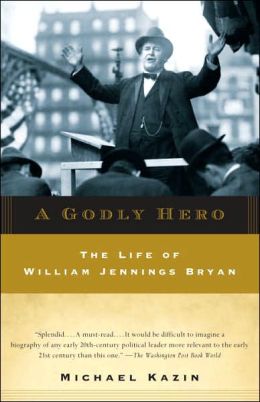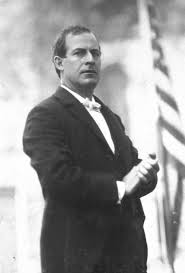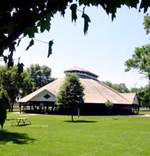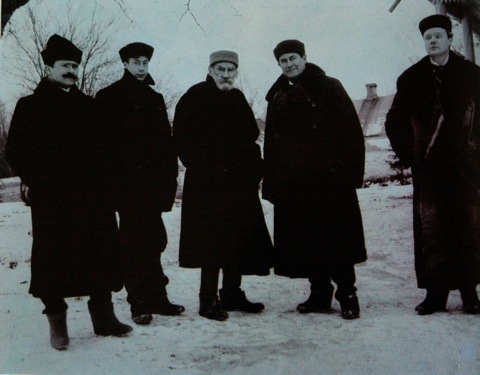My project on presidents of the United States extends to some also rans, and this is the first one I have read about. Others on the also ran list include Henry Clay, Harold Stassen, George Wallace, and Eugene Debs. A varied lot. I also have my eye on Jefferson Davis, an American president who was not a president of the United States, like Sam Houston. I also include the last Hawaiian monarch for the future.
A Godly Hero: The Life of William Jennings Bryan by Michael Kazin (2006), Recommended.
Bryan was a man born to the priesthood but made a career in and through politics. Famous as the most remarkable public speaker of his era and perhaps of any era. Cynics, enemies, skeptics, critics, as well as friends and admirers were swept up in the moment when he spoke from the rostrum.
Some say he made the Democratic Party what it is today: Liberal. Government has to serve the majority and protect them from the moneyed interest of corporations, trusts, and plutocrats. Read on to find out more….

From a prosperous and devout family, the word of God was instilled in him and it stayed. His father was life long Jacksonian Democrat who became a judge. Bryan completed a law degree at Northwestern University in Chicago. When he married, he moved to Lincoln Nebraska which was a boom town in those days.
Though only a two-term congressman he dominated American politics in the years from 1893 to 1914. When he spoke a good part of the nation listened. Those who could not listen, read his words, often aloud to each other. When he spoke his many opponents had to react and reply.
The Democrats and Republicans of the time – The Gilded Age in history textbooks – vied to support big business, railroads, oil companies, steel mills, and most of all bankers. The novels of Edith Wharton and Henry James capture much of the time for the Eastern wealthy. Frank Norris, Sinclair Lewis, Theodore Dreiser, and Upton Sinclair describe the other 99% of the population in their novels. Norris’s The Jungle is never to be forgotten, the story of a laborer in Chicago in 1906: abused, enslaved, cheated, degraded, and the cycle recurs again, and again unto death.
A crack in the veneer of the Gilded Age appeared when an economic downturn came, as they do. The incumbent Democrat president, Grover Cleveland, was so desperate that the federal government borrowed money – a lot of it – from the legendary financier J. P. Morgan, on his terms. To a man like Bryan that arrangement confirmed that money bought government. (The only source of revenue for the federal government at the time was the tariff on imports and the cost of the tariff wall was born by the 99%, not the 1% in the Wharton and James novels. The tariff was a hidden subsidy to those who owned mills, factories, works, kilns, and the like.)
Populism had its day. It was the voice of small holders, farmers who worked their own land, miners with their own claim, hunters who sold furs to the Astor company, the laborers who worked with them, the seed company owner, the man who repaired windmills, the itinerant tinker who fixed everything, the woman who took in laundry, the shop keeper who sold the cloth which women made into clothing, the carpenter who made the weasel for weaving at home, the hotel maid, railway workers of all kinds, and so on. Invisible from Washington D. C. these people populated the mid-west and western states.
When Bryan ran for the Senate from Nebraska he won 75% of the popular vote but the Republican legislature selected one of its own, a Republican, for Washington. In those times United States Senators were (s)elected by state legislatures. (South Carolina was the last state to change, reluctantly, that.) Among other things on the Populist agenda was the direct election of senators of the people to serve in Washington. Wikipedia has the larger story.
In the Depression of 1893 adherence to the gold standard was blamed for the crises. The Cleveland administration claimed it had to stick to the gold standard because the major trading partner, Great Britain used it. To critics these confirmed the continued domination of England at the expense of those migrants in the near, middle, and far west, few of whom came from England.
Bryan saw the devastation of the depression in his law practice and organized meetings, and since he organized them he spoke at them, and he spoke and he spoke some more. He fixed on the use of silver rather than gold as the base for paper money and that became the issue he ran for Congress on. He won in a three way race the first time, and squeaked back in the second time in a two way race in the face of a Republican landslide. Then, as now, it was rare for a Democrat to win in Nebraska. (The Republican Abraham Lincoln made Nebraska a state and Nebraskans have been loyal to the Republicans since!)
Though the author does not use that much overused word ‘charisma’ it is what Bryan had. When he talked everyone listened. And many could hear him for his voice carried without sounding strained or strident but rather conversational, say witnesses. He was a spellbinder whose listeners unconsciously suspended disbelief. The testimony is convincing. Without sound amplification he communicated to 20,000 auditors who were often standing for the two hours he spoke. It was a phenomenon.

The psychologist who founded the American Psychological Association William James went to examine him as a specimen and left as a convert as he confessed to his brother Henry James.
Journalist and novelist Willa Cather, after hearing him speak, was left speechless and so awed she was unable to interview him for the profile she had been commissioned to do.
H. L. Mencken, the greatest cynic of the ages, said it was most important experience of his life when he first heard Bryan speak. Yes, Mencken turned on Bryan later as he turned on everyone else, but the first time it was baptismal experience for him and the anger of his later denunciation of Bryan must come from the embarrassment of hindsight.
Rock ribbed Republican journalist William Allen White supposed Bryan to be a demagogue and interviewed Bryan extensively to establish that. In the end he proclaimed Bryan’s absolute sincerity and humanity.
If Bryan moved these intellectuals, he positively galvanized the wider public. His mail ran at 5000 letters a week, sometimes 2,000 in a single day after a major speech, each of which his wife Mary answered, but more importantly registered and catalogued. His brother, Charles, created a card index of the people Bryan met on his speaking tours for future contact. In time their combined card indices came to 600,000 individuals to whom they sent direct mail. (When 20th Century campaign managers re-discovered direct mail, they declared themselves geniuses. What is old is new again.)
He was the leading draw card of the Chautauqua movement. See Wikipedia for details. Accordingly he spoke here more than once.

At the Democratic nominating convention in 1896 Bryan was merely a delegate, but as a well-known orator by then he was offered the chance to speak before the nominations began. He did, and when the tumult died down he was nominated to run for president at age 35 (he would be 36 – the qualifying age – before inauguration day). It was the first of three tilts, with an allusion to Don Quixote. He remains the youngest man to be nominated by a major party, i.e., a major party by definition is one whose nominees have before won the office.
He lost each time and shrugged it off with a smile as God’s will. His politics was an applied Christianity of the New Testament. Completely unaffected and straightforward. What you hear is what there is. No hidden depths, no the brooding silences of Lincoln, no the titanic rages of an Andrew Jackson, no self-imposed isolation of Jefferson, no bookworm like Teddy Roosevelt, Bryan relied only on the New Testament and the Democratic Party. These two will protect the meek and weak and see to it that they inherit a goodly share of the earth.
Between and after presidential tilts in 1896, 1900, and 1908 he became a professional speaker. The author quantifies his speaking and it is amazing, the more so when one remembers there was no amplification. Perhaps six million people heard him talk over the years of his candidacy. He was a consummate professional who delivered one of his set piece speeches an estimated 6,000 times, each time with energy and freshness as if it just came to him.
He was a celebrity politician, more famous for his personality than for any policy, principle, or program he advanced.
While at the podium his approach was genial and avuncular wrapped in the familiar verities of the New Testament, yet he challenged audience when he championed women’s suffrage, labour unions, farmer’s cooperatives, opposed the Spanish-American War, denounced the conquest of the Philippines, advocated international disarmament, wrote the first income tax legislation, campaigned for the direct election of senators, and for prohibition (which at the time was the obverse of women’s suffrage). Enemies routinely assailed him a socialist or a dupe of socialists.
At the same time Bryan was completely indifferent to daily violence inflicted on black people everywhere, but especially in the South where Bryan had his largest following, despite the Biblical injunction that all men are brothers. He ignored the reign of Jim Crow. That was not cynicism about votes, but a culpable blind-spot.
When not campaigning Bryan and his wife Mary travelled the world and he met most of the heads of government or state in Europe and many in Asia. When he was offered the chance to speak in Berlin or Tokyo, he did. He won adherents there, through translators and across cultural divides. A Japanese student followed him back to Lincoln and in time became a de facto son. Bryan maintained a correspondence for years with many leaders he met in his travels. To many Europeans and Asians he was the one American they knew of and many had met him personally.
Bryan and Leo Tolstoy were soul mates, and when Tolstoy died the only decoration in his room was an autographed picture of Bryan. On one of his trips Bryan sought out Tolstoy, not for Tolstoy’s fame as a novelist, but for his fame as a Christian ascetic. Bryan was one of the few pilgrims, and there were many, to whom Tolstoy warmed. Tolstoy sent away most of the pilgrims without an interview, but he spent twelve (12) hours over two days with Bryan. By the way, Bryan cancelled a meeting with Czar of all the Russians to meet Tolstoy.

Many said then, including leaders of the Democratic party, and since that Bryan lacked the intellect to be president. [Pause.] One stops to think of the intellect of other candidates for and incumbents of that office before and after Bryan. [Pause.] Without naming names, perhaps what needs to be said is that instincts, humanity, insights, and decency are also important to that office and these Bryan had aplenty, whereas some who attained it before and after Bryan had none of those qualities. The same was also said when President Woodrow Wilson named Bryan his first Secretary of State. Again one pauses to consider the great intellects who have held that post before and after. Bryan was the most wordily and well travelled man in Wilson’s cabinet but he was not credited with that by supercilious intellectuals and journalists ever on the lookout then as now for a soft, stereotyped target. Because he was larger than life, Bryan offered a target everyday. He never took it personally and – in his own words – strived ‘to keep the faith.’ Would that we all could do just that.
It is true that he was not a reader or a thinker. Yet he liked what he saw in Europe where most public utilities, street cars, electricity, sewers, were publicly owed and he advocated that in the United States. He also bit the hand that fed him, the egregious William Randolph Hearst, who had long supported Bryan as a means to sell papers, when Bryan railed against the consolidation of the press in ever fewer hands.
In 1912 he influenced the Democratic nomination in favor of Woodrow Wilson, after Jefferson surely the greatest intellect ever to be President. Wilson relied on Bryan to liaise with Congress, and Bryan drafted much of the legislation Wilson proposed. He endured Wilson’s gunboat diplomacy in Latin America and Mexico but resigned in 1915 when he felt Wilson was not neutral in World War I. He wanted no part of the European slaughterhouse and thought Wilson was drifting into it, great intellect or not. He resigned on the principle of pacifism and was then denounced far and wide as a coward and traitor. In the face of that derision he continued to keep the faith.
Bryan was a far more complicated man than any stereotype. But like most of us he grew ever more rigid with age, and by the Scopes Trial he had shrunk to some distorted image of himself, though not nearly as crude as portrayed in Inherit the Wind.
At the time of the Scopes trial Darwinism was subsumed into Social Darwinism, which preached a eugenics and euthanasia that HItler and his kind would have recognized.
The book that Scopes taught from included this passage:
The feeble-minded are true parasites. If such people were lower animals, we would probably kill them off to prevent them from spreading. But all we can do with a degenerate human beings is to put them in asylums so they will have no contact with opposite sex [and breed].
Bryan found such sentiments anathema, all had a place in God’s world and he went to Dayton Tennessee to combat them. Once there he was out-maneuvered by his one-time seconder for a presidential nomination, Clarence Darrow, and made to look a fool. (Darrow out-maneuvered many others in his courtroom career, many who would be widely regarded as much smarter than Bryan but they were not larger than life and have sunk without a trace.) Mencken never let an opportunity pass to heap ridicule, shoveled it on, the more so since he regretted his earlier, momentary infatuation with Bryan.
Here is the irony: Since then self-proclaimed liberals have disowned the man who — thirty years before they became acceptable — pioneered, the eight-hour day, legal trade unions, the right to strike, graduated income tax, women’s suffrage, direct election of US senators, regulation of business, insured bank deposits, pacifism, public ownership of utilities like electricity and sewage and public transport, the federal reserve system, and many other issues and causes close to the liberal heart.
Kazin’s book is well researched, cogently presented, and ecumenical in conception. It does its subject justice without reducing anyone or anything to a stereotype or ciiché. He is professor of history at Georgetown University, where, I hope, he instils the same values in students.
Some early recordings are available at
Speech
I liked the two-minute homily on immortality. By contrast the later studio recordings sound laboured. They were done 20 years later, shortly before his death.
